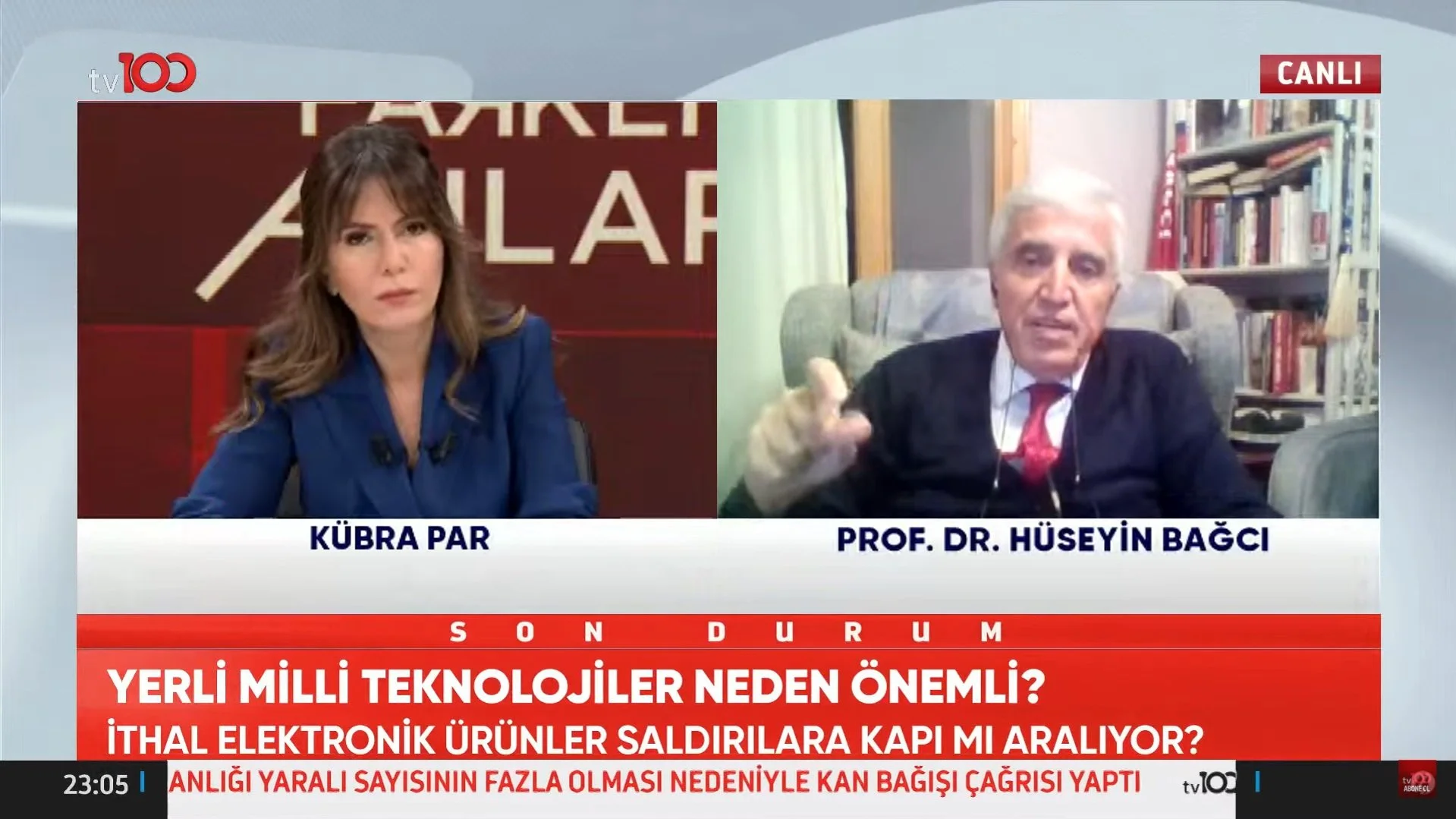Watch the segments from 2:07:55 to 02:15:35 and 02:17:50 to 2:20:15 for key insights from Prof. Dr. Hüseyin Bağcı.
Prof. Dr. Hüseyin Bağcı Explores Global Implications of Israel's Cyber Attack on Hezbollah
On September 17, 2024, Prof. Dr. Hüseyin Bağcı, the co-founder of Ankara Global Advisory Group, shared his deep insights on the geopolitical and technological impacts of Israel's recent cyber attack on Hezbollah. Speaking on TV100’s "Kübra Par'la Farklı Açılar" program, Bağcı emphasized the significance of this incident and its broader implications for international security.
Key Insights from Hüseyin Bağcı:
Cybersecurity as the New Battlefield: Prof. Bağcı highlighted that the Israel-Hezbollah cyber attack marks a pivotal moment in warfare. He noted how cyber threats have transcended conventional arms, with nations now increasingly vulnerable to digital invasions. The sophistication of cyberattacks like this one underscores the global race for supremacy in artificial intelligence (AI) and cybersecurity technologies.
AI: The Next Frontier of Conflict: Referencing historical and contemporary sources, Bağcı drew attention to AI’s growing role in global security dynamics. He cited Henry Kissinger’s warnings and Yuval Noah Harari’s work, emphasizing that AI-powered conflicts, as exemplified by the recent Israel-Lebanon events, represent a fundamental shift. As AI develops, states that adapt quickly will gain strategic advantages, leaving those lagging behind vulnerable to new forms of terror and warfare.
The International Web of Cyber Warfare: Bağcı raised questions about the possible international involvement in the attack, despite the U.S. distancing itself from the incident. He pointed out that cyber warfare, especially with AI integration, often involves a network of actors, whether through direct engagement or indirect support. This attack, he argued, is a signal that global players, including the U.S., are deeply intertwined in these conflicts.
China’s Technological Dominance: With a personal anecdote from his visit to China, Bağcı illustrated how China has taken the lead in AI and surveillance technology. He noted the country's extensive use of domestic software and the vast surveillance infrastructure it has built, positioning itself as a formidable player in the realm of cyber warfare. China’s strategic control of technology, he suggested, is setting the stage for future conflicts driven by AI.
The Role of International Security Alliances: Bağcı underscored the importance of alliances like NATO in addressing the new wave of cyber threats. Drawing on the example of Estonia's cyber attack by Russia, he explained how NATO's Tallinn-based cybersecurity center is pivotal in defending against such threats. These alliances, he argued, must now extend their traditional defense mechanisms to confront emerging digital threats.
Global Vulnerabilities and State Readiness: One of Bağcı’s most pressing concerns was the global lack of preparedness for the evolving cyber landscape. He stressed that many nations are still adjusting to these rapid changes, with states like the U.S. and China leading the charge while others remain at risk. Bağcı used the example of leaked personal data in Turkey to emphasize how digital security failures can compromise entire nations.
Migration and Cybersecurity: Linking cyber threats to migration challenges, Bağcı discussed how cybersecurity could impact state policies, particularly in Europe. He shared insights from a recent European Union meeting, highlighting Germany’s struggle with migrant influxes and suggesting that cybersecurity vulnerabilities could exacerbate migration crises, influencing political and economic stability.
Conclusion: Cyber Warfare as a Part of Larger Global Shift
In his analysis, Prof. Dr. Hüseyin Bağcı underscored that the Israel-Hezbollah cyber attack is not an isolated incident but part of a larger, more complex global shift. With artificial intelligence at the forefront of future conflicts, the international community must quickly adapt to these technological realities. As Bağcı highlighted, states that fail to prepare for the rising tide of cyber threats risk significant vulnerabilities, both in national security and economic stability. The evolving nature of warfare—now driven by digital and AI capabilities—demands a recalibration of global security strategies and international alliances to protect against an increasingly interconnected and high-tech battlefield.
Ankara Global Advisory Group is proud to continue offering thought leadership on key international issues, ensuring that global decision-makers are equipped with the knowledge they need to navigate complex security dynamics.
For a more detailed analysis from Prof. Dr. Hüseyin Bağcı and the latest developments in international relations, continue following updates from Ankara Global Advisory Group.
